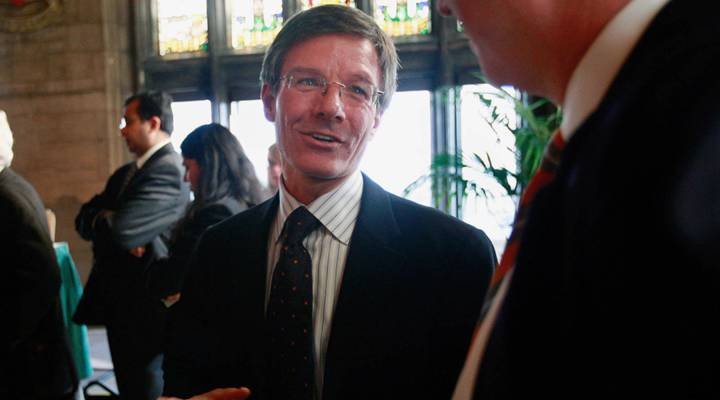
For Allstate CEO, the insurance business is all about the severe weather
For Allstate CEO, the insurance business is all about the severe weather

It’s been a busy year, if you work in the insurance business.
Coming out of the last couple of months of severe weather and wildfires, there have been plenty of claims to file. Chicago-based Allstate is one of the insurance companies receiving those claims, and Tom Wilson is it’s CEO. Marketplace host Kai Ryssdal sat down with Wilson to talk about taxes and how an insurer thinks about a year of bad weather. The following is an edited transcript of their conversation.
Kai Ryssdal: All right, let me throw a couple of phrases at you, get your gut-level reaction. The first one, obviously given this season, has to be hurricanes.
Tom Wilson: Well, there’s a lot more damage than hurricanes. So there’s straight line winds, there’s wildfires, you know, up in Napa. There’s hail. So these disasters happen continuously all throughout the year. We spend over several billion dollars a year helping people rebuild. And so, it’s all about the severe weather, and the weather is worse.
Ryssdal: You know, you’re the guy — or one of several guys and people — who pays for our rebuilding in areas where we know bad things are going to happen, right? They’re going to rebuild in mountainous areas and we’re going to have fires there. We’re going to rebuild on beaches. And we know we’re going to have floods and hurricanes there. Are we doing it wrong?
Wilson: There’s two parts to that. So first there’s the private part. So in the private market, it works pretty well. I believe that governments are not doing it well. Particularly the federal government. So, as you point out, you know, people have floods. Same house floods three times in a row, people rebuild it three times in a row. And we’re using taxpayers’ money to redo that. Really the federal government needs to think about this more holistically, rather than just get in and when bad things happen, start helicoptering in and throwing all kinds of money out at people because it’s politically expedient.
Ryssdal: Well so let’s take Houston, just for an example, where I know you probably lost a whole bunch of money in the flooding after Hurricane Harvey. Should the government be saying to people, “you know what, you cannot believe in what is now a dried out reservoir, but when the rains come, you’re going to be underwater”?
Wilson: Well, I think you can’t do it immediately, right? Because people built there, and they built there under the rules that existed at the time. But I think what the federal government could do is say over time, we’re going to move to a different system. So if you’re supposed to pay $500 for insurance, and today you’re paying $100, over the next three or four years, we’re going to get you up to $500. If you shouldn’t be there at all, then we’re not going to let you rebuild. So we really need a multi-year plan to get ourselves out from where we built stuff, what’s in harm’s way.
Ryssdal: Let me turn the page here for a second to sort of a second gig that you have. You’re the chairman of the U.S. Chamber of Commerce. We’ve had those folks on a couple of times in the last couple of months, talking about some of the policy changes that are going on in Washington. I wonder how you see the chamber’s role in the Trump administration’s economic policies, and where the Chamber stands on that. Because the folks we’ve talked to have not always been in favor of what’s going on.
Wilson: Well let me back up a little bit. So first, I believe that the U.S. Chamber is there to help business do what it does best, which is create prosperity. So you know, we take iron rocks and we make steel skyscrapers. We take some molecules, a little chemistry, and some brain power, and make life-saving drugs. That’s what business does. Governments can’t do that, and nonprofits can’t do that. Sometimes it’s aligned with what the government wants to do, sometimes it’s not aligned with what the government wants to do. So for example, today, on free trade, basically the Chamber is keeping the whole NAFTA thing alive by working with Canada and Mexico and the U.S. to try to move that to some answer. The Chamber is in favor of other policies that the government is putting for. So it depends whether it aligns with our ability to help businesses do what they do best.
Ryssdal: As the guy running Allstate, and also as the guy representing the Chamber, how much are you banking on tax reform, just in terms of economic growth in this economy, and also for your own business?
Wilson: Well we think the taxes should be reformed. It’s almost like built-up wax on the table. You remember that lemon Pledge ad? There’s just been too much wax built up. So we’ve got to clean it up. We need to make it more competitive internationally, in part because I think people just gamed the system today. They move locus of profits around the world to try to pay less tax. And we need to change that. We do think lower taxes will drive growth, but I don’t think that’s the end. I think that’s chapter one. Chapter two has to be, how do we do that and not burden our children with increasing amounts of debt? Which chapter three means how do we make sure that people get what they need, but that the entitlements don’t run out of control.
Ryssdal: Well, let me out a chapter four. How do you give corporations tax cuts, which you say corporations need to grow this economy, without burdening average middle-class taxpayers? Which is what it seems this tax bill does.
Wilson: This tax bill doesn’t actually raise taxes for middle-income people. What it may do is create an increased deficit for the government. Then you get into, well, will it drive enough growth? I believe that no tax bill is going to solve all of our problems. We still need to go back and figure out how do we balance the budget? Or at least not run as large a deficit as we will do. So there’s more work to be done, but you’ve got to do one things at a time. You know, Washington is having a hard time getting one thing done, much less a comprehensive program that deals with all the things we got going.
Correction (November 27, 2017): A previous version of this story identified Tom Wilson in the photo caption as chairman, CEO and president. He is the chairman and CEO of Allstate.
Listen to the rest of this interview on our podcast, Corner Office from Marketplace.
There’s a lot happening in the world. Through it all, Marketplace is here for you.
You rely on Marketplace to break down the world’s events and tell you how it affects you in a fact-based, approachable way. We rely on your financial support to keep making that possible.
Your donation today powers the independent journalism that you rely on. For just $5/month, you can help sustain Marketplace so we can keep reporting on the things that matter to you.


















